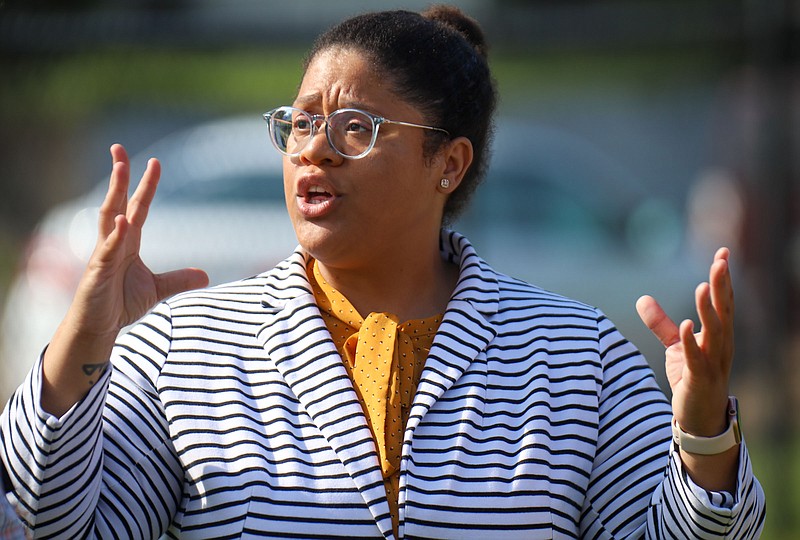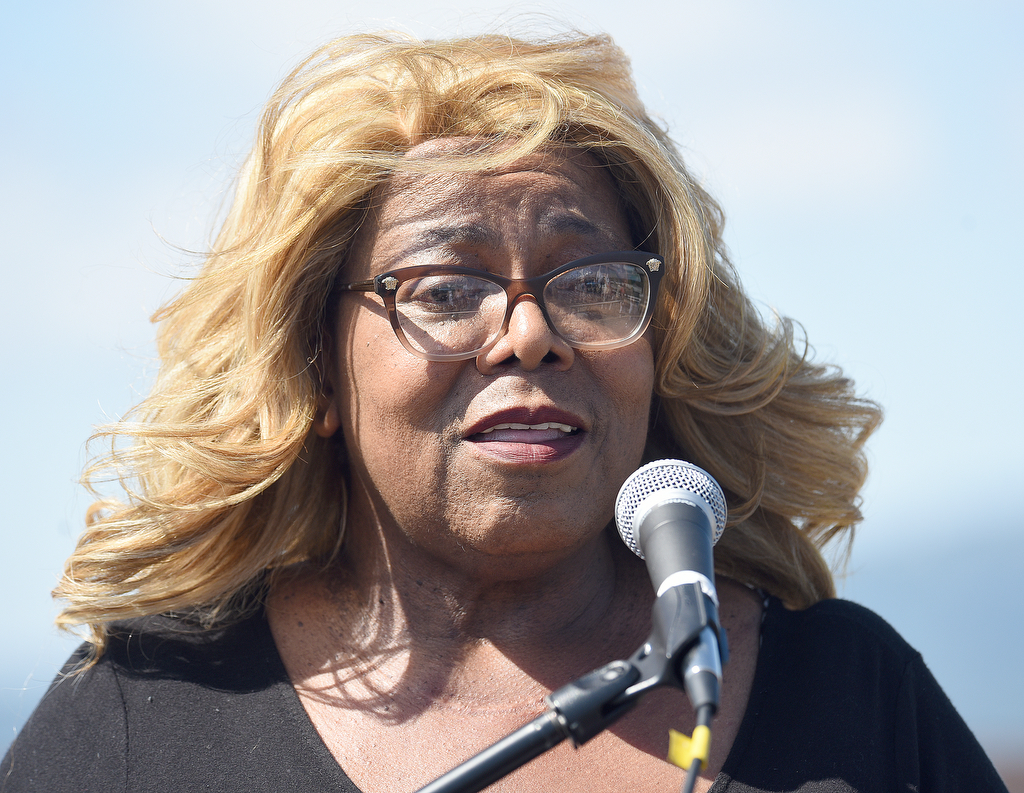Activist Marie Mott, who is running for the District 8 seat on the Chattanooga City Council, is defending comments she made in 2020 about Jewish slave owners, which have resurfaced on social media less than two weeks before the Sept. 15 election.
On Tuesday, an anonymous Twitter account with nine followers posted an approximately 35-second video of Mott in which she states that Jews "participated in the institution of chattel slavery."
"Yes, they owned slaves in the South," she said in the video. "Yes, they joined the Confederacy and took up arms against this nation with traitors to uphold the institution of slavery. Yes. Yes it happened. When are we going to deal with it? It happened. When are we going to deal with it? What are we going to do?"
The account, called Mott Speaks, was created in September, and the clip was pulled from a 30-minute video posted on Facebook, which the operator of the Twitter account shared with the Chattanooga Times Free Press. The operator declined to identify himself or herself to the paper.
"As leaders, we are held responsible for our actions," City Councilwoman Marvene Noel, of Orchard Knob, said in a statement to the Times Free Press.
Noel is defending her seat in the runoff election against Mott.
Mott Jewish statement full.MP4 from Mott Speaks on Vimeo.
"That is exactly what is happening to my opponent. Ms. Mott's words have hurt members of our Jewish community, and she will have to reconcile this. My campaign had nothing to do with this video, but my heart goes out to all those affected."
On Aug. 4, three candidates were on the ballot for council's District 8 seat, which was previously held by former Councilman Anthony Byrd before he stepped down to become Chattanooga's City Court clerk. Council members appointed Noel to fill the seat in March. The district contains areas of Chattanooga including Alton Park, Avondale, Bushtown, Courthouse, Downtown, East Chattanooga, East Lake, Eastside and Ridgedale.
Mott was the highest vote-getter on Aug. 4, capturing 46.3% of the of the 1,202 total votes cast, but she fell short of a majority of more than 50%, which prompted the runoff. Noel was second with 28.4% of the vote, and Malarie B. Marsh was third with 24.5%.
Marsh won't proceed to the election this September, and she has endorsed Mott in the runoff. Mayor Tim Kelly has endorsed Noel.
Reached by phone on Thursday, Mott declined to elaborate on her remarks, but she defended her statements in a series of Tweets in the replies of the original post, advising people to read literature addressing the subject.
"Let's recap what was said: Did Jewish people participate in the Transatlantic slave trade? Yes," she wrote in one post. "Did Jewish people broker slave in southern cities? Yes. Did Jewish people take part in the confederacy to maintain slavery? Yes. Is this documented? Yes."
In the longer version of the video, Mott said several Native American tribes also owned slaves, and it was no different in the Jewish community. Many Jews immigrated to America and lived in the South, she said, and participated in the institution of slavery. They also "overwhelmingly joined the Confederacy as a community, and it wasn't until we get to the end of the Civil War that you actually see some Jews ... that end up joining the Union," she claimed in the video.
"I believe that the only way that we get to the other side of the pain that we experienced and get to reconciliation and get to peace amongst one another is that we have to acknowledge what has happened at certain intersections in history and how Black people have been treated by all sorts of groups," she said at the beginning of the video. "It's a very complicated relationship between the Black community and the Jewish community. ... This has happened not only with our Jewish community. This has happened in our Native American community."
Seth Weitz, a history professor at Dalton State College who is also Jewish, responded to Mott on Twitter. Weitz said he specializes in Black America, Southern U.S. history and civil rights.
"I'll never defend a Jewish slave owner or one who took up arms against the US," he wrote. "I will though, point out when someone distorts historical facts. Were there Jewish Confederates? Yes. Were there Jewish slave owners? Yes.
"Were they small (tiny in the case of slave owners) and not representative of the entire population? Yes," he continued. "Should we talk about them? Of course. What you did is distort facts and manipulate history to fit a narrative. You did exactly what you're blaming others of doing.
Weitz told the Times Free Press by phone Thursday that there were Jews in the South who owned slaves. What he and others take umbrage with, he said, are statistics Mott shared and language she used implying that Jewish people overwhelmingly supported the Confederacy and played a major role in the institution of slavery, which Weitz said is untrue.
Mott's initial video, he said, dates back to 2020. It came after actor and musician Nick Cannon made antisemitic remarks on his podcast, "Cannon's Class," for which he later apologized.
In 1840, Weitz said, there were about 45,000 slave owners throughout the entire South who owned 20 or more slaves. About 120 of those were Jewish. Additionally, out of the 12,000 slave owners who owned 50 or more slaves in the American South, Weitz said, 20 were Jewish.
On the eve of the Civil War, 150,000 Jewish people lived in the United States, he said, and 25,000 of them resided in the South.
"To say that Jewish Americans overwhelmingly supported the Confederacy is statistically impossible," he said, adding that out of the approximately 10,000 Jews who fought in the Civil War, fewer than 3,000 fought for the Confederacy and more than 7,000 for the Union.
There were about 15,000 Jews living in the United States until 1840, Weitz said, and then there was a huge influx between 1840 and 1860. That's in large part because many were involved in mid-19th century revolutions across Central Europe and fled for political reasons.
Less than 1% of the white Northern population participated in the abolitionist movement, Weitz said, and although he's sure there were Jewish people involved, there weren't many prominent figures who spoke out.
There weren't many Jews living in the North to begin with, he said. Some were fleeing persecution on religious and political grounds, and they didn't want to put a target on their backs in a new country.
"They knew they were already an 'other' being Jewish in a 99.9% Christian nation," he said. "They didn't want to stick out. They wanted to assimilate. It's a far cry from the modern civil rights movement (in the 1950s and 1960s), where a lot of rabbis played a prominent role."
Contact David Floyd at dfloyd@timesfreepress.com or 423-757-6249. Follow him on Twitter @flavid_doyd.

